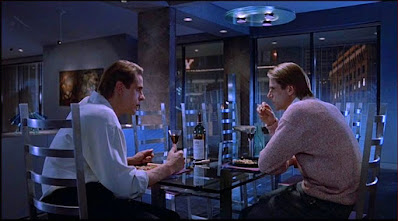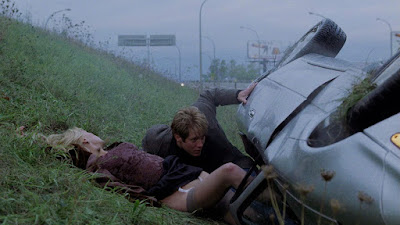 |
| Dead Ringers (Directed by David Cronenberg) |
In the following extract from an article in the Los Angeles Review of Books, David Cronenberg talks about his transition from writing original cinematic works to working on adaptations.
 |
| The Dead Zone (Directed by David Cronenberg) |
As a young upstart filmmaker I felt that you were not a real filmmaker if you didn't write your own stuff and it should be original. And that was beyond the French version of the auteur theory which was really meant to rehabilitate the artistic credibility of guys like Howard Hawks and John Ford. The French were saying a director could work within the studio system and still be an artist and that those guys were, even though they didn't normally write their own stuff. And for years I said, no, no you have to write your own stuff. But then I got involved with Stephen King's The Dead Zone, and it was more of a studio project, and there were five scripts that had been written, one of them by Stephen King himself, and frankly I didn't think his script was the best of the five. In fact, I thought that if I did his script people would kill me for betraying his novel. I think what happened is that he just wanted to try something else. He wasn't interested in just doing the novels, so he changed it quite a lot to the point where it was less like the novel than Jeffrey Boam's script, which was actually more faithful. So I started to work with Jeffrey Boam, and I started to really enjoy the process of working with other people and on the script, and I thought, well this is interesting 'cause what it means is, if you mix your blood with other people's, then you will create something that you wouldn't have done on your own, but is enough of you that it's exciting and feels like you. It's kind of like making children.
Beyond that, frankly, what opened the door for me doing adaptations was realizing that it doesn't matter where the idea for the movie comes from. For me it's really just a matter of developing every aspect that you can as an artist. Film art is so complex that it's very rare to have someone who's good at every aspect of it. You could be good with actors but not have a really strong visual sense, or you have a strong visual sense, but you have a tin ear when it comes to music. Or your eye for costumes isn't so great; so you learn to work with other people who are good at the stuff you're not good at. And you have to be very honest with yourself because otherwise you're short changing yourself. I mean, if you can't admit to yourself that you're no good visually, you're not really going to let a director of photography help you. And then you're going to make flawed movies that could have been better if you'd allowed yourself to collaborate more.
 |
| Naked Lunch (Directed by David Cronenberg) |
It's dangerous to be an artist. That's what we talk about in Naked Lunch. It's dangerous on many different levels. Politically it can be dangerous, but psychologically it can be quite dangerous too. You make yourself very vulnerable. You put yourself out there and of course you open yourself up to criticism and attack. And so you have to be strong if you're going to make movies. But once you accept that movies can come from anywhere, that a movie can come from a dream or a conversation or a newspaper article, or it could be based on real people, you can expand that and say it could come from a work of art that someone has already done. It could be a play, it could be a novel, it could be a remake of another movie, and of course I've done all those things, and in each case the satisfaction comes from making a good movie; not from where the movie comes from. I don't have to question it if I find the story interesting.
Like, I find psychoanalysis interesting, even though I've never undergone analysis myself, but I think it's a really interesting, new, relationship that Freud invented; a relationship between an analyst and a patient. And I'm thinking that's kinda intriguing, because we kinda accept that as a basic relationship that humans can have, between an analyst and a patient, but before Freud it didn't exist! The closest you might have got was a priest in a confessional, but there, you know the priest is very judgmental, having a huge religious structure informing everything he reacts to, so here you have a totally different kind of thing...
 |
| Dead Ringers (Directed by David Cronenberg) |
It's just that certain projects are, in their nature, extreme. Like Dead Ringers. The first I heard of the Marcus twins, these real twins, was a little article and I still remember the headline: "Twin Docs Found Dead in Posh Pad." I read that and thought: that's got to be a movie! I followed it back to the source and eventually there was an article by Ron Rosenbaum in Esquire called "Dead Ringers" and it was fantastic and I thought: I would like to do this story, but I don't to really base it on the real guys 100%. I don't want it to be a biography, but it's too good a structure. I mean, it's like a fiction thing. Who could ever imagine such a thing? It was too perfect. So I went through, it was Joe Roth at the beginning before he was any studio thing, he was an independent producer. And Carol Baum. And we started talking with my friend Norman Snider who then wrote the first draft and it took ten years from that point to get it made. Ten years. Very difficult. I mean we had the classic thing; we got, "do they have to be gynecologists? Can't they be lawyers?" We literally got that! And I said "do you think that's better?!" And we got "do they both have to die?" and that was the end of that conversation. We got all the sorts of conservative things that would turn that project into trash basically and it went through many incarnations before finally we got it made. But to make it more accessible or more palatable would subvert the reason for actually making the movie.
 |
| Crash (Directed by David Cronenberg) |
But movies like Crash or Naked Lunch can't cost a hundred million dollars and you must make sure they don't. You accept the limitations of the budget when you make an extreme or difficult movie — it's whatever it is you can raise. And then of course, there's a certain point where you say: can I actually make it well, for that money? Do I have to sacrifice any quality? And there are moments where I've said, about projects: I can't raise enough money to actually make the movie well, so therefore I'm not going to make it. I have to consider the outcome. Or for instance Spider. I really wanted ten million dollars to make Spider and we could only raise eight. And at that point it was, okay, do we make this movie or not? You know, if we make it for eight then it means we all literally have to not get paid. And I include there, Ralph Fiennes, Miranda Richardson, and the Producer and the Writer and the Director — me — but we all loved the project so much and we were already so far engaged in it, that we all agreed to do that. So we literally all of us, and Patrick McGrath the writer of the novel, we all literally didn't get paid and we made the movie for eight million, but we really needed ten. So that's an unusual moment, and just in terms of financial survival you can't do that very often, because you're spending two years of your life making a movie and you're making zero money during those two years. But that was sort of a happy case because we managed to survive it. Ralph went off and did Red Dragon and got a big payday. I didn't! But one thing that's interesting is, since we're showing A Dangerous Method to Jungians and Freudians, I've discovered that they and psychiatrists often show Spider to students and other doctors as an illustration of what schizophrenia might feel like from the inside. From the point of view of a schizophrenic. They feel that it's an incredibly accurate depiction of the experience of schizophrenia and that it's very useful for doctors and psychiatrists so I kinda like that.
Full article at the LARB here